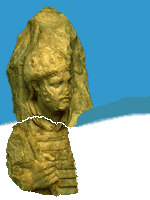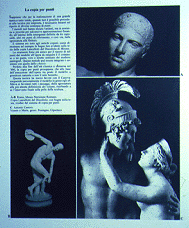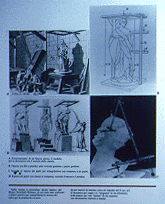

Copying with the Pointing Process
When the use of molds and casts is impossible in the replication of large-scale three-dimensional works of art, the alternative is a copying technique that relies on the spatial relationships between hundreds of points.  The
known pointing methods have several variants, but all basically proceed
through several stages by transposing successive series of points from
a model to the copy. Each stage uses three datum points, another three
reference points, and so on, from the initial blocking out to the finished
replica.
The
known pointing methods have several variants, but all basically proceed
through several stages by transposing successive series of points from
a model to the copy. Each stage uses three datum points, another three
reference points, and so on, from the initial blocking out to the finished
replica.
This system was known to ancient copyists, as can be seen, for example, in the raised points on the Lancellotti copy of the Discobolos of Myron.
Perhaps the most ancient instrument for transferring points from the model to the copy was a three-armed compass, the direct antecedent of modern pantographs. This method could be combined with or replaced by a device called a chassis.
Lost at the end of classical antiquity and reinvented in the 15th century, the pointing process requires a true-scale rather than a miniature model.
 The
pointing technique found new favor with Canova. He personally created
the plaster models for his sculptures but turned over to his assistants
all subsequent stages of execution, from roughing out to the more demanding
definition of forms. Canova reserved for himself only the final treatment
of the surface of his sculptures.
The
pointing technique found new favor with Canova. He personally created
the plaster models for his sculptures but turned over to his assistants
all subsequent stages of execution, from roughing out to the more demanding
definition of forms. Canova reserved for himself only the final treatment
of the surface of his sculptures.
Illustrations
- Rome. Museo Nazionale
Romano.
Lancellotti copy of the Discobolos with raised points on the head, remnants of the pointing process. - Antonio Canova.
Venus and Mars, plaster. Passagno, Gipsoteca.
Copyright ©1997, 2002 Ministero per i Beni Culturali e Ambientali, Soprintendenza Archeologica di Roma and the Kelsey Museum of Archaeology, University of Michigan. All rights reserved.
 |
 |
 |
 |
 |
 |
 |
 |
 |
 |
 |
 |